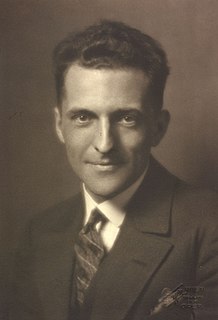Related Research Articles
Franz Leopold Neumann was a German political activist, Western Marxist theorist and labor lawyer, who became a political scientist in exile and is best known for his theoretical analyses of National Socialism. He studied in Germany and the United Kingdom, and spent the last phase of his career in the United States, where he worked for the Office of Strategic Services from 1943 to 1945. During the Second World War, Neumann spied for the Soviet Union under the code-name "Ruff". Together with Ernst Fraenkel and Arnold Bergstraesser, Neumann is considered to be among the founders of modern political science in the Federal Republic of Germany.

Alfred Baeumler, was an Austrian-born German philosopher, pedagogue and prominent Nazi ideologue. From 1924 he taught at the Technische Universität Dresden, at first as an unsalaried lecturer Privatdozent. Bäumler was made associate professor (Extraordinarius) in 1928 and full professor (Ordinarius) a year later. From 1933 he taught philosophy and political education in Berlin as the director of the Institute for Political Pedagogy.
Emanuel Hirsch was a German Protestant theologian and also a member of the Nazi Party and the Nazi supporting body. He escaped denazification at the end of the war by quitting his professorship, allegedly for health reasons, losing the pension from his University.

Wenzel Jaksch was a Sudeten German Social Democrat politician and the president of the Federation of Expellees in 1964 to 1966.
Walter Fedor Georg Abendroth was a German composer, editor, and writer on music.
Gustav Gassner was a German botanist and plant pathologist whose 1918 paper on vernalization has been called "the first systematic study of temperature as a factor in the developmental physiology of plants."
The Institute for Research on the Jewish Question was a Nazi Party political institution, founded in April 1939. Conceived as a branch of a projected elite university of the party under the direction of Alfred Rosenberg, it officially opened in Frankfurt am Main in March 1941, during the Second World War, and remained in existence until the end of the war, in 1945.

The Academy for German Law was an institute for legal research and reform founded on 26 June 1933 in Nazi Germany. After suspending its operations during the Second World War in August 1944, it was abolished after the fall of the Nazi regime on 8 May 1945.
Ernst Sprockhoff was a German prehistorian and inventor of the Sprockhoff numbering system for megalithic monuments in Germany.

Wolfgang Steinitz was a German linguist and folklorist. Through his rediscovery of hidden social commentary in traditional folk songs, he was an important pioneer of the German folk-revival in both East and West Germany. He researched the language and culture of the Ugric peoples of West Siberia, including the songs that form an important part of the tradition of this endangered ethnic group. Steinitz also left extensive work in other areas of linguistic studies.
Friedrich Wettstein, Ritter von Westersheim was an Austrian botanist.
Karl Anders was a German political activist who was forced to emigrate during the Nazi period. After the war he became a print and broadcast journalist.
Friedrich Lütge was a German economist, social historian and economic historian.

Willi Birkelbach was a West German politician (SPD). He was a member of the West German Bundestag between 1949 and 1964. Between 1952 and 1964 he also served as an increasingly prominent Member of the European Parliament.

Joseph Maria Müller-Blattau was a German musicologist and National Socialist cultural official. He is regarded as a "nestor of Saarbrücken musicology" but also as a "singer of a musical seizure of power" because of his activities in National Socialism.
Helmuth Osthoff was a German musicologist and composer. Much of his career was spent at Frankfurt University, prior to which he held posts at Halle University and Berlin University. He wrote the first major biography on the composer Josquin des Prez, published as a two volume monograph in 1962 and 1965
Wolfgang Boetticher was a German musicologist and longtime lecturer at the University of Göttingen.
Walther Hermann Vetter was a German musicologist. From 1946 to 1958, he was professor at the Humboldt University of Berlin.
Friedrich Wilhelm Herzog was a German writer and music critic.